Introduction to
Kidney basics
Your kidneys are bean-shaped organs about the size of small fists. They’re located below the rib cage on each side of your backbone.

Image courtesy of The Kidney Foundation of Canada
Kidneys play an important role in your health, by:
- Filtering waste from your blood
- Removing extra fluid such as urine
- Balancing acid/base and minerals in the body
- Producing hormones which help to control blood pressure and make red blood cells
- Producing vitamin D to keep bones healthy
» Stages of chronic kidney disease
| Stage | Description | Estimated glomerular filtration rate (GFR) level |
| 1 | normal kidney function but medical tests suggest some kidney damage or disease | 90 mL/min or more |
| 2 | mildly reduced kidney function | 60 to 89 mL/min |
| 3 | moderately reduced kidney function | 30 to 59 mL/min |
| 4 | severely reduced kidney function | 15 to 29 mL/min |
| 5 | established kidney disease | less than 15 mL/min |
The symptoms of advanced kidney disease are extreme fatigue, nausea and vomiting, shortness of breath, loss of appetite, itchy skin, swelling, trouble concentrating and drowsiness. These are typical symptoms that may occur. Your doctor will advise when to start treatment.
The most common causes of kidney disease are diabetes and high blood pressure, but it may also be caused by autoimmune diseases, genetic disorders such as polycystic kidney disease, medications and supplements, chronic kidney infections, blockage of urine flow from kidneys, surgical removal of kidneys and critical illness.
Treatment options
There are different treatment options for chronic kidney disease. These include peritoneal dialysis, hemodialysis, kidney transplant and conservative management.
The peritoneal membrane is inside your belly and is used to perform peritoneal dialysis. The catheter is inserted ahead of time, and dialysis fluid is exchanged in your belly multiple times to clean your blood.
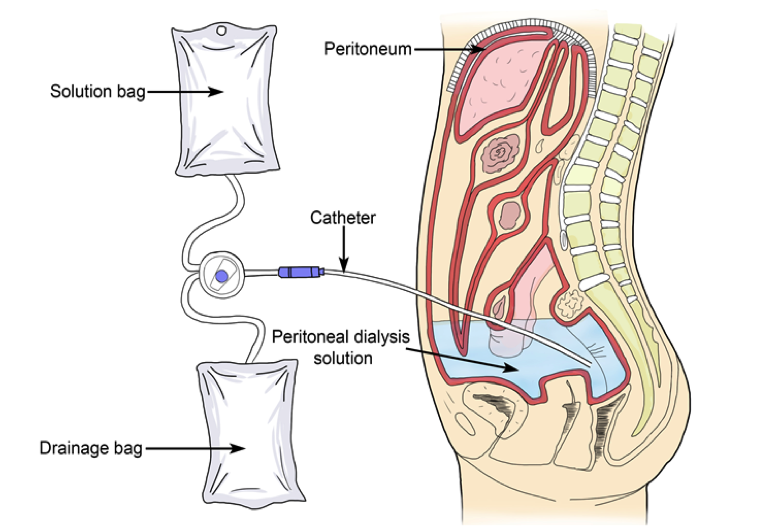
Image courtesy NKF Singapore
Peritoneal dialysis can be performed at home. Home dialysis nurses provide training (which takes approximately five days). Patients having peritoneal dialysis at home require space for supplies.
Home dialysis nurses and technical support are on-call 24/7. Home care nurses from Community Care Access Centre will be available to assist with peritoneal dialysis. Patients on this type of dialysis will also have routine home visits and telephone calls from the home dialysis team, in addition to clinic visits with your kidney team every one or two months.
There are two kinds of peritoneal dialysis
Continuous ambulatory peritoneal dialysis
- This type is performed manually four times a day, with each exchange taking about 45 minutes
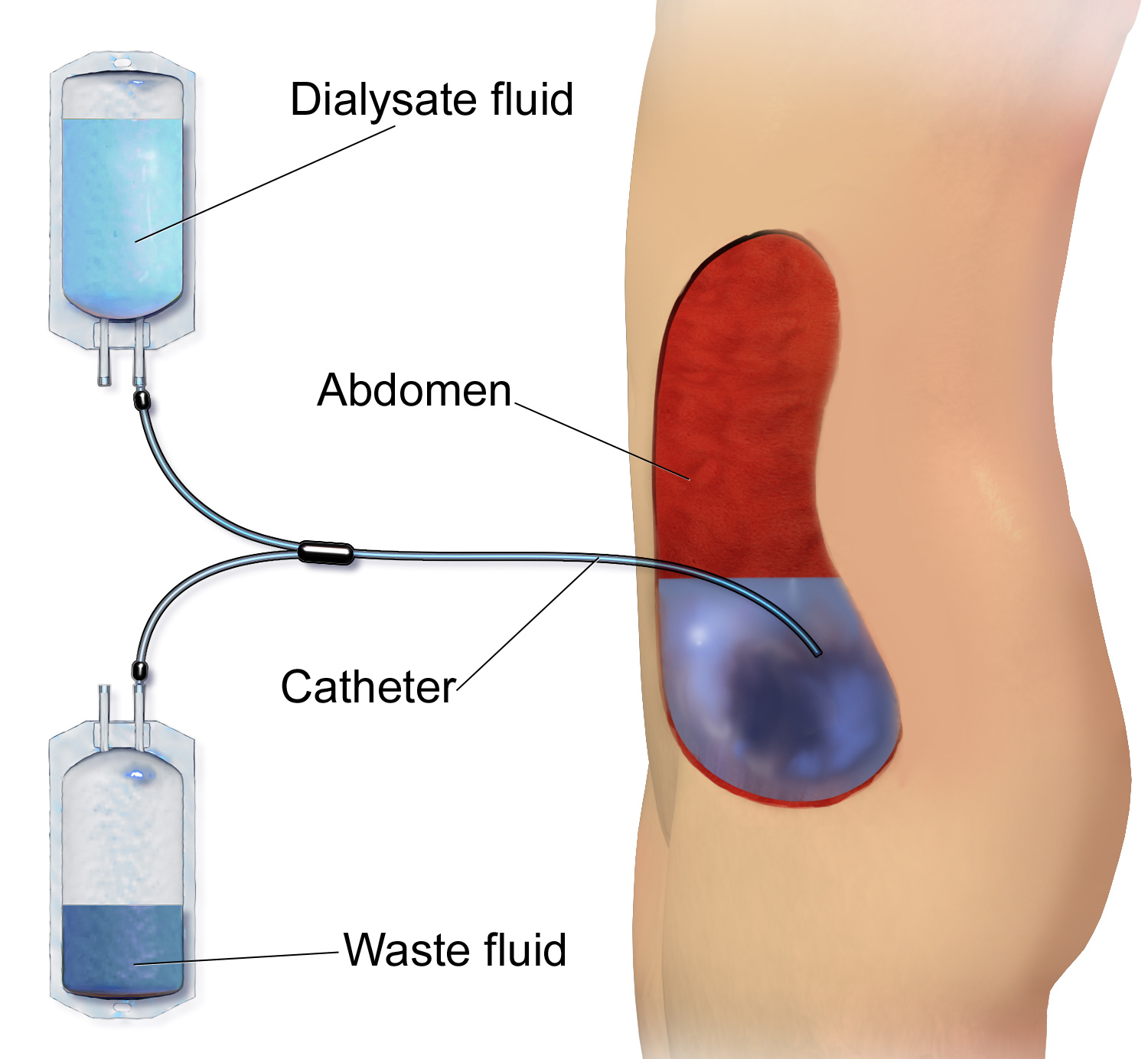
Image courtesy: Blausen.com staff (2014). "Medical gallery of Blausen Medical 2014". WikiJournal of Medicine 1 (2). DOI:10.15347/wjm/2014.010. ISSN 2002-4436.
Automated peritoneal dialysis
- This type is performed every night using a machine called a cycler
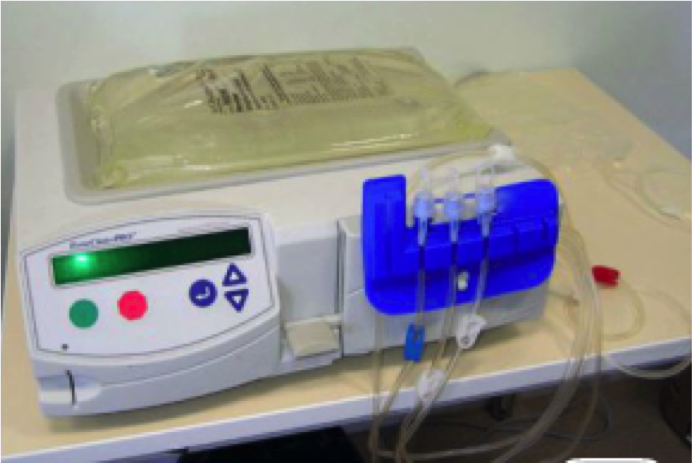
Why consider peritoneal dialysis?
- Flexibility of time
- Avoids frequent travel to a dialysis unit
- Needles not required for dialysis treatments
- Blood is not circulating outside of the body
- Travel on peritoneal dialysis is easier than on hemodialysis
- There is a decreased impact on work, life and social activities
What are the risks associated with peritoneal dialysis?
- There is a risk of infection at the catheter exit site or in the fluid inside the belly
- There may be catheter flow problems, from constipation or change in the catheter tip position over time
Hemodialysis cleans the blood through a hemodialysis machine and filter (called a dialyzer). Hemodialysis requires access to the bloodstream.
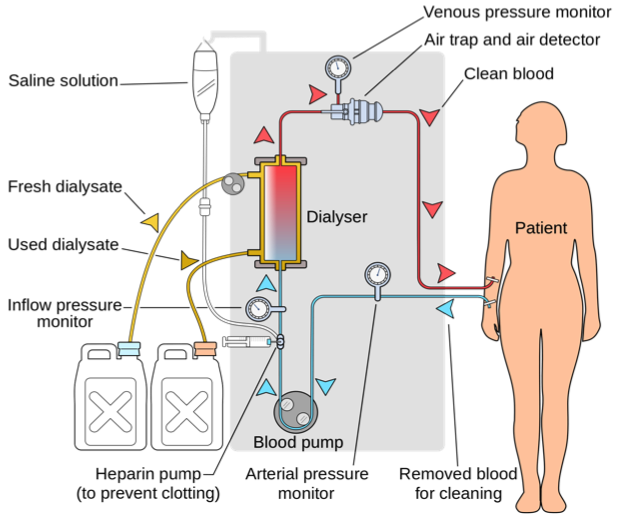
By GYassineMrabetTalk. This vector image was created with Inkscape. - Own work from Image:Hemodialysis schematic.gif., CC BY 3.0, https://commons.wikimedia.org/w/index.php?curid=3411574
There are three forms of hemodialysis: home hemodialysis, in-centre hemodialysis and community-based hemodialysis.
Home hemodialysis
Home hemodialysis is performed by an individual or caregiver at home. It can be done during the day (called conventional or short daily hemodialysis) or during the night (called nocturnal hemodialysis). Plumbing and electrical modifications are required prior to installing the machine, and space is required for supplies.
Home hemodialysis machine
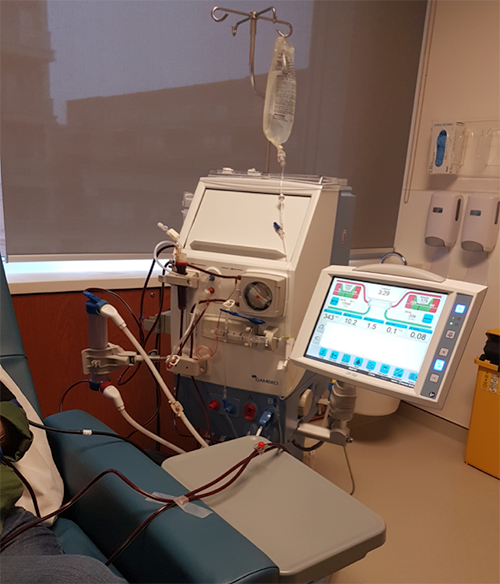
Water treatment system
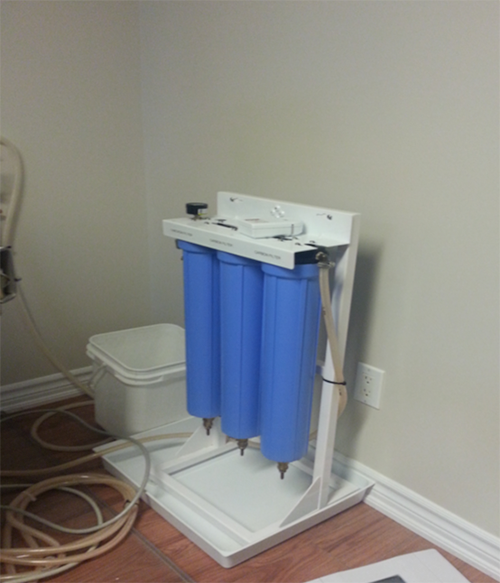
Home dialysis nurses provide training that may take six to eight weeks. Home dialysis nurses and technical support are on-call 24/7, and patients receive routine home visits and telephone calls from the home dialysis team. Patients attend clinic visits with your kidney team every one to two months. Home care nurses from the Community Care Access Centre are not available to provide home hemodialysis.
Why consider home hemodialysis?
- Flexibility of time/schedule
- Avoids frequent travel to a dialysis unit
- Travel is possible while on home hemodialysis
- Decreased impact on work, life and social activities
In-centre hemodialysis
In-centre hemodialysis typically requires three treatments per week in hospital. Treatment time is around four hours, however you should account for travel time, as well as wait time and recovery time. On the treatment days, be prepared to spend the majority of your day in hospital. Based on availability, an appointment time and schedule for treatments will be assigned: Monday, Wednesday and Friday OR Tuesday, Thursday and Saturday (7:30 a.m., 12:30 p.m. or 5:30 p.m.)
Some considerations of in-centre hemodialysis
- Monitoring is provided by the nursing staff of your kidney team
- Certain members of your kidney team will visit you weekly on dialysis
- If needed, you may request to see a member of your kidney team during one of your dialysis treatments
- Activity is restricted during treatment
- Eating before or after treatment is preferred, not during
- It may not be safe to drive if feeling unwell after treatment
- Travel is possible
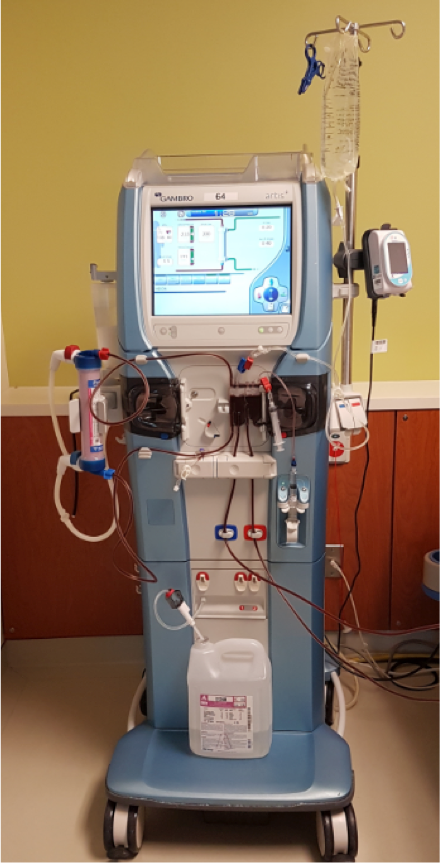
Community-based hemodialysis
Community-based hemodialysis centres allow patients to receive dialysis closer to home in a more independent care facility and allows the home environment to be free of hemodialysis supplies. Hemodialysis in this setting is provided by nurses (there are no doctors on site). Monitoring is provided by the nurses of your kidney team at the community-based centre. Centres in the Greater Toronto Area include Sheppard Centre (Yonge & Sheppard), Dialysis Management Clinics (Markham and Pickering) and the Sussex Centre (Mississauga). Clinic visits with your kidney team at Sunnybrook are initally every five weeks, then every ten weeks.
What are the risks associated with hemodialysis?
- Central venous catheters are associated with the highest risk of bloodstream infections, which may result in a serious infection requiring hospitalization.
- Low blood pressure may occur as a result of fluid removal during dialysis.
While transplant is the best option for treating kidney failure, the wait times are long. A kidney transplant is a surgical procedure in which a donor kidney is implanted to the recipient’s abdomen. The donor kidney can come from a person who has died suddenly (deceased donor) or a living person (living donor).
Options for a kidney transplant
- Living Donor - If a living donor is available, transplant prior to starting dialysis may be possible. The average wait time for Sunnybrook patients is one to two years. This option is available to a select group of patients. You and your donor need to be carefully evaluated and this could take six to twelve months.
- Deceased Donor - If a living donor is not available, then assessment for transplant can only begin after starting dialysis. The average wait time for patients in the province of Ontario is three to ten years.
Ineligibility for kidney transplant: The Ontario government has listed some conditions that will prevent you from receiving a kidney transplant, including but not limited to:
- Uncorrectable cardiac or peripheral vascular disease
- Certain cancers
- Uncorrectable psychiatric condition or cognitive impairment
- Severe uncorrectable impaired physical condition
- Short life expectancy
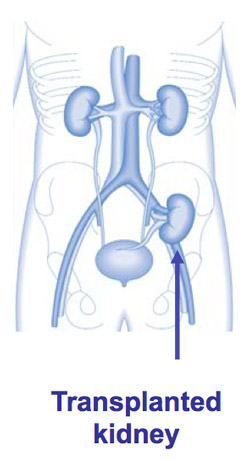
Image courtesy of The Kidney Foundation of Canada
Why consider a kidney transplant?
- No more dialysis is required
- No need to follow dialysis schedule
- Less restrictions on diet and fluid
- Improved quality of life – feel healthier
- Fewer hospitalizations
- Lower risk of heart attack and stroke
- Overall, individuals with a kidney transplant live longer than those on dialysis
What are the risks associated with kidney transplant?
Potential complications include:
- Complications related to medications
- Acute rejection
- Chronic rejection
Kidney transplantation support
- Ongoing communication as needed with transplant kidney team at Sunnybrook during workup
- Group and one-on-one education sessions with a social worker and/or the coordinator of the transplant kidney team at the transplant centre/hospital
- Regular clinic visits with your transplant kidney team at the transplant centre/hospital after your transplant
- Peer support is available from patients who were donors and those that were recipients.
» Comprehensive conservative renal care
Conservative care focuses on symptom management, pain control and quality of life. This generally means no dialysis. Without dialysis, individuals will grow weaker and eventually will die.
Support
A dialysis trial may be possible while choosing conservative care. If an individual chooses not to receive dialysis, community and hospital supports are available.
Treatment decision map
Quick links
Contact us »
Nephrology division
Sunnybrook Health Sciences Centre
Kidney Care Centre at the CNIB Centre
1929 Bayview Ave., 3rd floor
Toronto, ON M4G 3E8
Phone:
416-480-6100 ext. 63863
Email:
SunnybrookNephrology@sunnybrook.ca
Division Head:
Dr. Matthew Oliver
Dialysis unit
Phone: 416-480-4488
Fax: 416-480-4485
Appointments »
All appointments (including questions about, or changes to appointments) MUST be coordinated by your care team. Clinic patients are now seen at the CNIB Satellite Centre, with the exception of the HIV Renal Disease Clinic, and the Pregnancy and Kidney Disease (PreKID) Clinic; these two clinics remain at Sunnybrook's (main) Bayview Campus.
Clinics »
Meet our team »
Patient education »
Physician education »
Refer a patient »
Each of our clinics manage their own referral process. Please refer to our clinic information page for referral details and documentation requirements.






